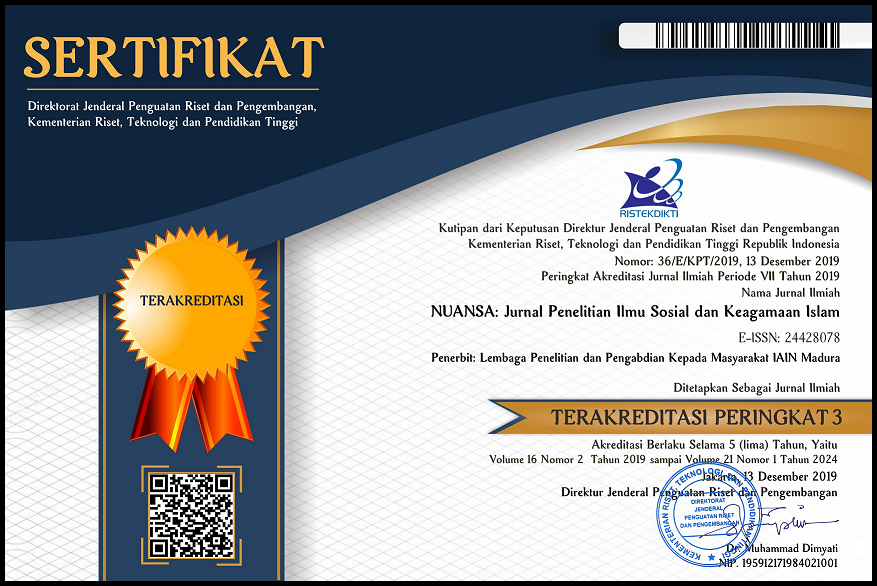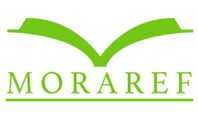Portrait of Islamic Religious Education in Public Universities in the 5.0 Era
 Abstract views: 593
,
Abstract views: 593
,
 pdf downloads: 193
pdf downloads: 193
Abstract
In the 5.0 era, Islamic religious instruction in higher education is crucial as in forming students' morality and character. With a correct and deep understanding of religion, students can internalize these values in their daily lives and make good and responsible decisions. The article's aim is to give an outline of the Islamic religious teaching and learning processes in public colleges as of 5.0. A qualitative research methodology was adopted, and instructors and students were interviewed as well as observed to obtain data involved in the learning and teaching process of Islam in public universities. Then, content analysis is used to assess the acquired data utilizing qualitative data analysis techniques. The findings indicated that there is still room for improvement in the standard of Islamic religious instruction in public universities, especially in terms of subpar teaching and learning. Lack of emphasis on character education, poor teaching, and minimal use of technological in the process of learning and instruction are some of the reasons that contribute to the poor quality of Islamic religious education in public universities. Thus, character education, raising the bar of instruction, and implementing better technology in the learning and teaching process of Islam in the 5.0 era are necessary to improve the quality of Islamic religious instruction in public universities.
(Di era 5.0, pengajaran agama Islam di perguruan tinggi menjadi sangat penting dalam membentuk moralitas dan karakter mahasiswa. Dengan pemahaman agama yang benar dan mendalam, mahasiswa dapat menginternalisasi nilai-nilai tersebut dalam kehidupan sehari-hari dan mengambil keputusan yang baik dan bertanggung jawab. Artikel ini bertujuan untuk memberikan gambaran umum tentang proses pengajaran dan pembelajaran agama Islam di perguruan tinggi umum di era 5.0. Metodologi penelitian kualitatif diadopsi, dan para pengajar serta mahasiswa diwawancarai serta diobservasi untuk mendapatkan data yang terlibat dalam proses belajar dan mengajar agama Islam di perguruan tinggi umum. Kemudian, analisis isi digunakan untuk menilai data yang diperoleh dengan menggunakan teknik analisis data kualitatif. Temuan penelitian menunjukkan bahwa masih ada ruang untuk perbaikan dalam standar pengajaran agama Islam di perguruan tinggi umum, terutama dalam hal pengajaran dan pembelajaran yang masih di bawah standar. Kurangnya penekanan pada pendidikan karakter, pengajaran yang buruk, dan minimnya penggunaan teknologi dalam proses belajar mengajar merupakan beberapa alasan yang berkontribusi terhadap rendahnya kualitas pendidikan agama Islam di universitas umum. Oleh karena itu, pendidikan karakter, peningkatan standar pengajaran, dan penerapan teknologi yang lebih baik dalam proses pembelajaran dan pengajaran agama Islam di era 5.0 sangat diperlukan untuk meningkatkan kualitas pengajaran agama Islam di perguruan tinggi umum.)
Downloads
References
Alam, Masnur, dan Pristian Hadi Putra, “The Challenges Of Islamic Religious Education And Spirituality Within Higher Education In Indonesia : The Case Of Jambi Province,” The Seybold Report Journal, 18.2 (2023), 1030–38 <https://doi.org/10.17605/OSF.IO/FSXPV>
Alimni, Alimni, Alfauzan Amin, dan Dwi Agus Kurniawan, “The role of Islamic education teachers in fostering students’ emotional intelligence,” International Journal of Evaluation and Research in Education (IJERE), 11.4 (2022), 1881 <https://doi.org/10.11591/ijere.v11i4.22116>
Amaly, Abdul Mun’im, Uus Ruswandi, Giantomi Muhammad, dan Muhammad Erihadiana, “PAI (Islamic Religious Education) Teacher in Facing The Millenial Era Challenges,” Al-Tadzkiyyah: Jurnal Pendidikan Islam, 13.1 (2022), 47–62 <https://doi.org/10.24042/atjpi.v13i1.9438>
Amin Abdullah, M., “Religion, science and culture: An integrated, interconnected paradigm of science,” Al-Jami’ah, 52.1 (2014), 175–203 <https://doi.org/10.14421/ajis.2014.521.175-203>
Anam, Saeful, I Nyoman Sudana Degeng, Nurul Murtadho, dan Dedi Kuswandi, “The Moral Education and Internalization of Humanitarian Values in Pesantren: A Case Study from Indonesia,” Journal for the Education of Gifted Young Scientists, 7.4 (2019), 815–34 <https://doi.org/10.17478/jegys.629726>
Asyafah, Abas, “Research based instruction in the teaching of islamic education,” SpringerPlus, 3.1 (2014), 755 <https://doi.org/10.1186/2193-1801-3-755>
Baharudin, Parid, dan Opik Taupik Kurahman, “The Evaluation of Students’ Religious Development at School,” Al-Tadzkiyyah: Jurnal Pendidikan Islam, 13.1 (2022), 99–114 <https://doi.org/10.24042/atjpi.v13i1.8222>
Delors, Jacques, Learning: the treasure within; report to UNESCO of the international commission on education for the twenty-first century (highlights) (Paris: Unesco Publishing, 1996)
Demirel Ucan, Ayse, dan Andrew Wright, “Improving the pedagogy of Islamic religious education through an application of critical religious education, variation theory and the learning study model,” British Journal of Religious Education, 41.2 (2019), 202–17 <https://doi.org/10.1080/01416200.2018.1484695>
Direktur Jenderal Pendidikan Tinggi Departemen Pendidikan Nasional Republik Indonesia, Rambu-Rambu Pelaksanaan Mata Kuliah Pengembangan Kepribadian Di Perguruan Tinggi (Indonesia, 2000), hal. 1–10 <https://simpuh.kemenag.go.id/regulasi/djDikti_38_02.pdf>
Ediansyah, Ediansyah, Dwi Agus Kurniawan, Rahmat Perdana, dan Salamah Salamah, “Using problem-based learning in college: Mastery concepts subject statistical sesearch and motivation,” International Journal of Evaluation and Research in Education (IJERE), 8.3 (2019), 446 <https://doi.org/10.11591/ijere.v8i3.20243>
Fathur Rohman, “Problem Based Learning in Islamic Religious Education: The Case of the Indonesian Pesantren,” global journal al thaqafah, 12.1 (2022), 82–97 <https://doi.org/10.7187/GJAT072022-5>
Fauzi, Irzhal, dan Rofiatu Hosna, “The Urgency of Education in Islamic Boarding Schools in Improving The Quality of Islamic-Based Character Education,” Al-Tadzkiyyah: Jurnal Pendidikan Islam, 13.1 (2022), 63–76 <https://doi.org/10.24042/atjpi.v13i1.9985>
Fitriyawany, Fitriyawany, Lailatussaadah Lailatussaadah, dan Ida Meutiawati, “Integrating Islamic Values into Science Learning in Indonesian Islamic Higher Education: Expectation and Implementation,” Tadris: Jurnal Keguruan dan Ilmu Tarbiyah, 7.1 (2022), 119–32 <https://doi.org/10.24042/tadris.v7i1.10802>
Hakim, Rosniati, Mahyudin Ritonga, Khodijah Khodijah, Zulmuqim Zulmuqim, Remiswal Remiswal, dan Ahmad Reshad Jamalyar, “Learning Strategies for Reading and Writing the Quran: Improving Student Competence as Preservice Teachers at the Faculty of Tarbiyah and Teacher Training,” ed. oleh Mehdi Nasri, Education Research International, 2022 (2022), 1–7 <https://doi.org/10.1155/2022/3464265>
Hamzah, Amir, Metode penelitian studi kasus (Malang: Literasi Nusantara Abadi, 2020)
Idi, Abdullah, Pengembangan kurikulum (teori & praktik) (Jakarta: Rajawali Pers, 2016)
Idris, Muhammad, “Pendidikan Islam dan Era Society 5.0 ; Peluang dan Tantangan Bagi Mahasiswa PAI Menjadi Guru Berkarakter,” Belajea: Jurnal Pendidikan Islam, 7.1 (2022), 61 <https://doi.org/10.29240/belajea.v7i1.4159>
Ismail, Sanusi, Bustami Abubakar, Ajidar Matsyah, Muhammad Thalal, dan Hermansyah Yahya, “Religious Radicalism and Islamic Universities in Aceh: Between Campus, Environment and Family,” Samarah: Jurnal Hukum Keluarga dan Hukum Islam, 5.2 (2021), 1044 <https://doi.org/10.22373/sjhk.v5i2.10958>
Kosim, Mohammad, Faqihul Muqoddam, Faidol Mubarok, dan Nur Quma Laila, “The dynamics of Islamic education policies in Indonesia,” Cogent Education, 10.1 (2023) <https://doi.org/10.1080/2331186X.2023.2172930>
Lestiyani, Pudji, “Analisis Persepsi Civitas Akademika Terhadap Konsep Merdeka Belajar Menyongsong Era Industri 5.0,” Jurnal Kependidikan: Jurnal Hasil Penelitian dan Kajian Kepustakaan di Bidang Pendidikan, Pengajaran dan Pembelajaran, 6.3 (2020), 365 <https://doi.org/10.33394/jk.v6i3.2913>
Liu, Xunqian, dan Yi Yang, “The Hard Road to Reform: Curriculum Renewal for Muslim Education in Early Twentieth-Century China,” Religions, 14.1 (2022), 46 <https://doi.org/10.3390/rel14010046>
Lubis, Maimun Aqsha, Melor Md Yunus, Mohamed Amin Embi, Sabariah Sulaiman, dan Zamri Mahamod, “Systematic steps in teaching and learning Islamic Education in the classroom,” Procedia - Social and Behavioral Sciences, 7.2 (2010), 665–70 <https://doi.org/10.1016/j.sbspro.2010.10.090>
Ma`arif, Muhammad Anas, Muhammad Husnur Rofiq, dan Akhmad Sirojuddin, “Implementing Learning Strategies for Moderate Islamic Religious Education in Islamic Higher Education,” Jurnal Pendidikan Islam, 8.1 (2022), 75–86 <https://doi.org/10.15575/jpi.v8i1.19037>
Malla, Hamlan Andi Baso, Misnah Misnah, dan A. Markarma, “Implementation of Multicultural Values in Islamic Religious Education Based Media Animation Pictures as Prevention of Religious Radicalism in Poso, Central Sulawesi, Indonesia,” International Journal of Criminology and Sociology, 10 (2020), 51–57 <https://doi.org/10.6000/1929-4409.2021.10.08>
Miskiah, Miskiah, Yoyon Suryono, dan Ajat Sudrajat, “Integration of information and comunication technology into Islamic religious education teacher training,” Jurnal Cakrawala Pendidikan, 38.1 (2019), 130–40 <https://doi.org/10.21831/cp.v38i1.23439>
Muhaimin, Suti’ah, dan Nur Ali, Paradigma pendidikan islam : upaya mengefektifkan pendidikan agama islam di sekolah (Bandung: Remaja Rosdakarya, 2012)
Munadi, Muhammad, dan Khuriyah, “The extracurricular activities and student development of secondary school: Learning from Indonesia,” International Journal of Education and Practice, 11.1 (2023), 23–34 <https://doi.org/10.18488/61.v11i1.3245>
Muslim, Muslim, Heri Effendi, Pebriyenni Pebriyenni, M. Nursi, dan Siti Aisyah, “A Survey of the Character of Bung Hatta University Based on its Islamic Education Learning Program in the Digital Age,” Jurnal Educative: Journal of Educational Studies, 7.2 (2022), 139 <https://doi.org/10.30983/educative.v7i2.5789>
Nasution, Harun, Islam rasional : gagasan dan pemikiran (Bandung: IKAPI, 1996)
Nurjaman, Asep, Peningkatan Kemampuan Berpikir Kritis Dalam Pembelajaran Pendidikan Agama Islam Melalui Implementasi Desain Pembelajaran “Assure” (Indramayu: Adab, 2020)
Peedikayil, Joshith Vazhayil, Vrinda Vijayan, dan Thiyagu Kaliappan, “Teachers’ attitude towards education for sustainable development: A descriptive research,” International Journal of Evaluation and Research in Education (IJERE), 12.1 (2023), 86 <https://doi.org/10.11591/ijere.v12i1.23019>
Putra, Pristian Hadi, “Tantangan Pendidikan Islam dalam Menghadapi Society 5.0,” Islamika : Jurnal Ilmu-Ilmu Keislaman, 19.02 (2019), 99–110 <https://doi.org/10.32939/islamika.v19i02.458>
Raco, J.R., Metode penelitian kualitatif: jenis, karakteristik dan keunggulannya (Jakarta: Grasindo, 2010)
Rahmat, Munawar, Endis Firdaus, dan M. Wildan Yahya, “Creating Religious Tolerance through Quran-Based Learning Model for Religious Education,” Jurnal Pendidikan Islam, 5.2 (2019), 175–88 <https://doi.org/10.15575/jpi.v5i2.6467>
Rahmat, Munawar, dan M. Wildan Bin H. M. Yahya, “The Impact of Inclusive Islamic Education Teaching Materials Model on Religious Tolerance of Indonesian Students,” International Journal of Instruction, 15.1 (2022), 347–64 <https://doi.org/10.29333/iji.2022.15120a>
Raihani, Raihani, “A Model Of Islamic Teacher Education For Social Justice In Indonesia: A Critical Pedagogy Perspective,” JOURNAL OF INDONESIAN ISLAM, 14.1 (2020), 163 <https://doi.org/10.15642/JIIS.2020.14.1.163-186>
Ramayulis, Sejarah pendidikan Islam: napaktilas perubahan konsep, filsafat, dan metodologi pendidikan Islam dari era nabi SAW sampai ulama Nusantara (Jakarta: Kalam Mulia, 2011)
Republik Indonesia, Undang-Undang Republik Indonesia Nomor 20 Tahun 2003 tentang Sistem Pendidikan Nasional (Jakarta, Indonesia, 2003) <https://peraturan.bpk.go.id/Home/Download/32160/UU Nomor 20 Tahun 2003.pdf>
Sahin, Abdullah, “Critical issues in islamic education studies: Rethinking islamic and western liberal secular values of education,” Religions, 9.11 (2018) <https://doi.org/10.3390/rel9110335>
Sauri, Sofyan, Sandie Gunara, dan Febbry Cipta, “Establishing the identity of insan kamil generation through music learning activities in pesantren,” Heliyon, 8.7 (2022), e09958 <https://doi.org/10.1016/j.heliyon.2022.e09958>
Sirozi, Muhammad, dan Yenrizal, “Preventing Religious Radicalism on College Student in the Islamic State Higher Education (PTKIN) Case Study of Islamic State University (UIN) in Indonesia,” PalArch’s Journal of Archaeology of Egypt/ Egyptology, 17.6 (2020), 7062–84
Sugiyono, Metode Kuantitatif dan Kualitatif dan R&D (Bandung: Alfabeta, 2016)
Suyadi, Zalik Nuryana, Sutrisno, dan Baidi, “Academic reform and sustainability of Islamic higher education in Indonesia,” International Journal of Educational Development, 89 (2022), 102534 <https://doi.org/10.1016/j.ijedudev.2021.102534>
Suyadi, dan Hendro Widodo, “Millennialization of islamic education based on neuroscience in the third generation university in yogyakarta Indonesia,” Qudus International Journal of Islamic Studies, 7.1 (2019), 173–202 <https://doi.org/10.21043/qijis.v7i1.4922>
Tambak, Syahraini, dan Desi Sukenti, “Strengthening islamic behavior and islamic psychosocial in developing professional madrasah teachers,” Jurnal Cakrawala Pendidikan, 39.1 (2020), 65–78 <https://doi.org/10.21831/cp.v39i1.26001>
Tolchah, Moch, dan Muhammad Arfan Mu’ammar, “Islamic education in the globalization era; challenges, opportunities, and contribution of islamic education in indonesia,” Humanities and Social Sciences Reviews, 7.4 (2019), 1031–37 <https://doi.org/10.18510/hssr.2019.74141>
TvOne, “Arogansi Anak Pejabat Pajak Meresahkan, Pengamat Sosial UI beri Tanggapan,” tvonenews.com, 2023 <https://www.tvonenews.com/channel/news/105678-arogansi-anak-pejabat-pajak-meresahkan-pengamat-sosial-ui-beri-tanggapan> [diakses 26 Februari 2023]
Yin, Robert K., Studi kasus desain & metode, trans. oleh M. Djauzi Mudzakir (Jakarta: Rajawali Pers, 2011)
Yudiawan, Agus, Budi Sunarso, Suharmoko, Fatma Sari, dan Ahmadi, “Successful online learning factors in covid-19 era: Study of islamic higher education in west papua, indonesia,” International Journal of Evaluation and Research in Education, 10.1 (2021), 193–201 <https://doi.org/10.11591/ijere.v10i1.21036>
Zainuri, Ahmad, . Sukarno, dan Miftachul Huda, “Understanding Scientific Literacy and Pedagogy Competence: A Critical Insight into Religious Integration Thinking Skills,” Journal of Educational and Social Research, 12.1 (2022), 273 <https://doi.org/10.36941/jesr-2022-0022>
Copyright (c) 2023 NUANSA: Jurnal Penelitian Ilmu Sosial dan Keagamaan Islam

This work is licensed under a Creative Commons Attribution-NonCommercial 4.0 International License.
The journal operates an Open Access policy under a Creative Commons Attribution-NonCommercial 4.0 International License (CC-BY-NC) 
Authors who publish with this journal agree to the following terms:
- Authors retain copyright and grant the journal right of first publication with the work simultaneously licensed under a Creative Commons Attribution License that allows others to share the work with an acknowledgement of the work's authorship and initial publication in this journal.
- Authors are able to enter into separate, additional contractual arrangements for the non-exclusive distribution of the journal's published version of the work (e.g., post it to an institutional repository or publish it in a book), with an acknowledgement of its initial publication in this journal.
- Authors are permitted and encouraged to post their work online (e.g., in institutional repositories or on their website) prior to and during the submission process, as it can lead to productive exchanges, as well as earlier and greater citation of published work.





















